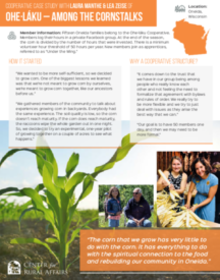Para la versión en español, por favor oprima aqui.
Location: Oneida, Wisconsin
Member information: Fifteen Oneida families belong to the Ohe∙láku Cooperative. Members log their hours in a private Facebook group. At the end of the season, the corn is divided by the number of hours that were invested. There is a minimum volunteer hour threshold of 50 hours per year. New members join as apprentices, referred to as “Under the Wing.”
How it started
“We wanted to be more self-sufficient, so we decided to grow corn. One of the biggest lessons we learned was that we’re not meant to grow corn by ourselves, we’re meant to grow corn together, like our ancestors before us.”
“We gathered members of the community to talk about experiences growing corn in backyards. Everybody had the same experience. The soil quality is low, so the corn doesn’t reach maturity. If the corn does reach maturity, the raccoons wipe the whole garden out in one night. So, we decided to try an experimental, one-year pilot of growing together on a couple of acres to see what happens.”
Why a cooperative structure?
“It comes down to the trust that we have in our group being among people who really know each other and not feeling the need to formalize that agreement with bylaws and rules of order. We really try to be more flexible and we try to just deal with issues as they arise the best way that we can.”
“Our goal is to have 50 members one day, and then we may need to be more formal.”
Q: Did you have any community partnerships or programs that assisted with the cooperative development?
A: We got a small Farmer Rancher grant from Sustainable Agricultural Research and Education (SARE). In addition, we have many relationships with organizations like Intertribal Agriculture Council and Braiding the Sacred. We also received a grant from the Great Lakes Commission. Another supporter of our cooperative is the Oneida Nation of Wisconsin, who provides us free land leases.
Q: In terms of equipment, did the cooperative purchase, lease, borrow the equipment you needed? Why did you choose to purchase/lease/borrow?
A: We decided to purchase equipment we would need to use regularly; a 1957 Case Tractor, a disc, a trailer, and a 500-gallon sprayer. Then we realized we needed to buy a cultivating tractor to get the weeds out between the rows and found a 1945 Allis Chalmers cultivating tractor. The equipment is stored at a barn the Oneida 4-H lets us use. We had access to equipment auctions and found what we needed in our budget.
Cooperative rules for success
1. Use advisers and committees effectively
Organizing human resources and effectively using their expertise, along with maximum participation by potential members is central to any successful business and crucial to the success of the cooperative.
2. Keep members informed and involved
Members’ participation in affairs of their cooperative increases their feeling of ownership and responsibility for its success.
3. Maintain good board-manager relations
The differing responsibilities of the board of directors and the manager must be clearly understood and carried out.
4. Conduct businesslike meetings
A good meeting results in carrying out several successive steps: planning ahead, involving members, following a published agenda, following through on meeting actions.
5. Follow sound business practices
These responsibilities include: Complete and accurate documentation of income and expenses, exact member records, periodic operating statements and balance sheets, annual full reports, annual independent audits, future planning.
6. Forge links with other cooperatives
An early exercise to determine whether to start a new cooperative is to investigate the alternative of linking with an existing cooperative that could expand its service territory.
This project was developed using a U.S. Department of Agriculture Rural Development Socially Disadvantaged Groups Grant. The Center for Rural Affairs is an equal opportunity provider and employer.


